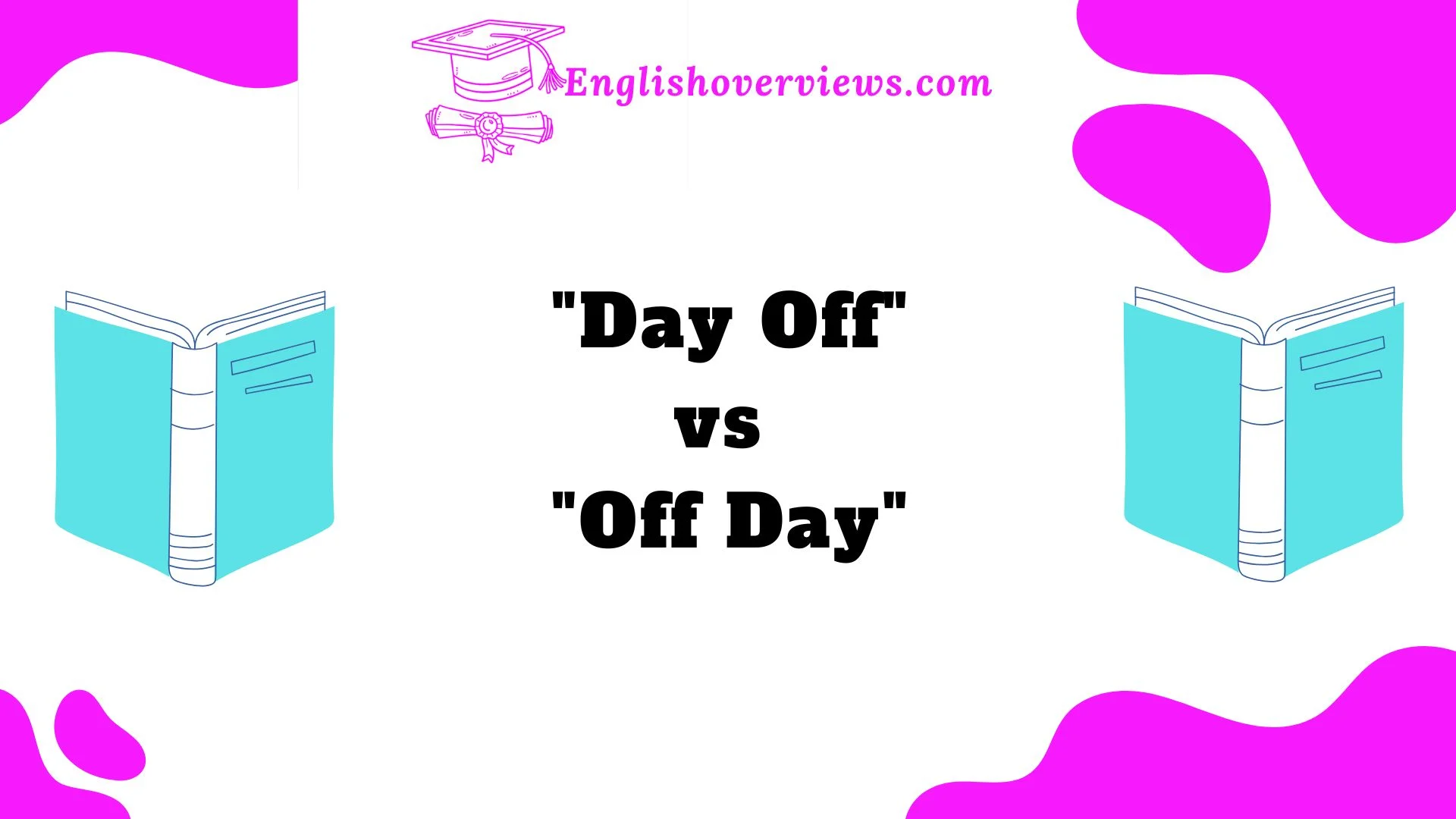When it comes to language, context is everything. Small differences in wording can change the entire meaning of a sentence. One example of this is the common confusion between the phrases “day off” and “off day.” While these phrases might sound similar, they have very distinct meanings and implications.
In this blog post, we’ll dive into the definitions, uses, and differences between “day off” and “off day.” By the end, you’ll understand when to use each phrase, avoid common mistakes, and sound more confident in your communication.
Plus, we’ll give you real-world examples, case studies, and helpful tips to make these terms work for you!
Introduction: Unlocking the Power of Common English Phrases
English is full of phrases that may sound familiar, but using them incorrectly can cause confusion. Understanding common terms like “day off” and “off day” is crucial for effective communication. These two expressions often get mixed up, but they serve different purposes. Knowing when to use each one can help you sound more natural and avoid misunderstandings.
Both phrases might seem simple at first glance, but their subtle differences can affect the tone and meaning of your conversation. Whether you’re talking about taking a break from work or describing a rough day, choosing the right expression matters.
Defining “Day Off” – A True Break from Routine
A “day off” refers to a planned break from your usual work or responsibilities. It’s a day when you can rest, relax, or pursue personal activities without the pressures of your regular schedule.
Key Features of a “Day Off”:
- Intentional rest: A day to recharge and relax.
- No work or obligations: Typically involves taking a break from work, school, or other duties.
- Planned and scheduled: Usually pre-arranged in advance.
Examples:
- “I’m taking a day off tomorrow to relax and catch up on sleep.”
- “We have a long weekend coming up, so I’m planning to take a day off from work.”
This phrase is often used in professional contexts but can also refer to any type of break, whether it’s from housework, social commitments, or other routines.
When and Why You Should Use “Day Off”
Knowing when to use “day off” can make a big difference in how you’re understood. Here are a few instances when it’s appropriate to use this phrase:
When to Use “Day Off”:
- Work and school: When talking about taking a break from your job or studies.
- Rest and relaxation: When you need a mental or physical break to recharge.
- Vacation: When you have a scheduled break to travel or enjoy time with family.
Why Use It:
A “day off” is usually associated with positive feelings, like relaxation, self-care, and enjoyment. It signals a planned rest that allows you to rejuvenate.
Real-Life Example:
- “I’ve been working hard all week, so I’m looking forward to my day off on Saturday.”
This highlights a planned rest to enjoy some personal time.
The Meaning of “Off Day” – More Than Just a Rest
Unlike “day off,” an “off day” doesn’t refer to taking time off to relax. Instead, it describes a day when things don’t go as expected, or when you’re not performing at your usual level.
Key Features of an “Off Day”:
- Unproductive or below-average performance: Your output, mood, or energy is not up to par.
- Frustration: Often involves challenges or things going wrong.
- Negative tone: Generally refers to a frustrating or disappointing day.
Examples:
- “I had an off day at work; nothing seemed to go right.”
- “I feel like I’m having an off day; I’m just not in the right mindset.”
“Off day” often has a negative or neutral tone, unlike the positive connotation of taking a day off. It’s typically used when something feels off in your mood, work, or energy.
“Day Off” vs. “Off Day”: Setting the Record Straight
The most important distinction between “day off” and “off day” is the intent and tone behind each phrase. Let’s break it down:
| Phrase | Meaning | Tone | Context |
| Day Off | A planned break from responsibilities. | Positive/Relaxed | Work, school, rest |
| Off Day | A day where performance or mood is below par. | Negative/Neutral | Mood, work, performance |
Why They Get Mixed Up:
The phrases sound very similar, and people may assume both refer to a break from work. However, “day off” signals a break to recharge, while “off day” suggests a bad day or unproductive time.
Contextual Differences: Understanding How Meaning Changes
Context is everything. Depending on how you use these phrases, their meaning can change drastically.
“Day Off” Example in Context:
- “I’m looking forward to my day off to go hiking in the mountains.”
- Here, the phrase implies a planned break for enjoyment.
“Off Day” Example in Context:
- “I’m having an off day at work today; I can’t concentrate.”
- Here, the phrase reflects a negative or underwhelming experience at work.
Understanding context is crucial to using these phrases correctly. When describing a rest or break, always go with “day off.” For challenging, frustrating, or unproductive days, use “off day.”
Common Misconceptions and Mistakes with “Day Off” and “Off Day”
Both of these phrases come with their fair share of confusion. Here are the most common mistakes people make:
Mistakes to Avoid:
- Confusing the two: Using “off day” when you mean a planned break or day off. This would sound like you’re having a bad day when you actually mean to say you’re taking a break.
- Overusing “off day”: Don’t use “off day” when you’re simply describing a rest. Use it only for unproductive or frustrating days.
How to Fix These Mistakes:
- If you’re talking about a planned break, always say “day off.”
- If you’re describing a rough day where things aren’t going well, use “off day.”
Real-Life Examples: Using “Day Off” Correctly in Sentences
Let’s look at some examples of how to use “day off” in different contexts:
- Work: “After a busy week, I’m so ready for my day off on Friday!”
- School: “I’m taking a day off tomorrow to catch up on assignments.”
- Personal Time: “I’ve been working non-stop, so I’m taking a day off to relax and binge-watch my favorite show.”
These examples show the positive, planned nature of a “day off.”
How “Off Day” is Used in Everyday Language
“Off day” often crops up in conversations when people talk about their moods, work performance, or energy levels. Here are some ways to use it in everyday language:
Examples:
- “I had an off day at the gym; I couldn’t lift as much as usual.”
- “My presentation didn’t go well today, I had an off day.”
An off day can apply to any situation where you feel out of sync or are struggling to perform at your usual level. It’s often used when things don’t go right.
Knowing When to Use “Day Off” and Its Synonyms
There are several terms you can use instead of “day off.” These include:
- Break: “I need a break from work.”
- Leave: “I’ve requested leave to take a day off.”
- Holiday: “I’m on holiday for the next few days.”
When to Use Synonyms:
- Break: When you need a short rest, not necessarily a full day.
- Leave: When referring to official leave from work.
- Holiday: When taking extended time off, often for vacation.
Alternatives to “Off Day” – Understanding Substitutes
If you’re looking for ways to express an “off day,” consider these alternatives:
- Bad day: “Today’s been a bad day; nothing is going right.”
- Rough day: “I had a rough day at work.”
- Down day: “I’m feeling a bit low today; it’s been a down day.”
Each of these alternatives can express a negative experience, but the tone can vary depending on which phrase you use.
Conclusion: Mastering the Nuances of “Day Off” and “Off Day”
Now that you understand the key differences between “day off” and “off day,” you can confidently use them in the right context. Context is key—remember that a “day off” is a planned break to relax, while an “off day” describes a day when things don’t go as planned.
By using these phrases correctly, you’ll sound more natural and avoid misunderstandings. Keep practicing, and soon enough, you’ll be a pro at distinguishing between the two!
FAQs:
- Can I use “off day” for a planned break?
- No, “off day” refers to a frustrating or unproductive day, not a day of rest.
- What’s the difference between “leave” and “day off”?
- “Leave” usually refers to official time off, often used in professional settings, while “day off” is more casual and refers to a break.
- Can “off day” be used in a positive sense?
- Generally, “off day” has a negative tone, implying that something went wrong or didn’t meet expectations.
- When should I use “day off” instead of “holiday”?
- “Day off” is usually for short breaks, while “holiday” often refers to a longer period away from work.

Alyan Ashraf is the creative mind behind English Overviews, a platform dedicated to helping learners master the English language. Passionate about education and language development, Alyan specializes in simplifying complex English concepts, making learning accessible for students of all levels.











